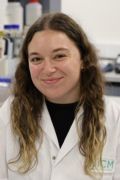Kayla Jaye

Harnessing the power of postbiotics against breast cancer mechanistic insights using live cell imaging, proteomics and microRNA analyses.
Breast cancer is a global health concern and is the most diagnosed cancer type in women, with a high incidence of mortality and burden on healthcare systems. The role of the gut microbiome in the normal physiological functioning of the human body, in addition to the treatment or prevention of disease, has been an evolving area of research in recent years. However, the mechanisms of action driving the anti-cancer potential of gut metabolites have not been thoroughly investigated, specifically in the context of triple-negative breast cancer (TNBC). This type of breast cancer is difficult to treat and often has poor prognoses, so finding adjuvant cancer therapies for this cancer type is of vital importance.
The present study aims to identify molecular pathways and mechanisms of action of key gut microbial metabolites in the treatment of breast cancer, as well as minimal residual disease (MRD). These experimental studies will provide a comprehensive understanding into the anti-cancer action of the gut metabolites against TNBC cell lines, as well as identify the specific molecular pathways activated during this activity and the mechanisms of action exhibited by these compounds.
The findings of this study will serve as a basis for future in vivo and clinical research into the action of gut metabolites as anti-cancer agents, which could revolutionise cancer therapy and the prognoses for patients with aggressive forms of breast cancer.
Supervisors:
